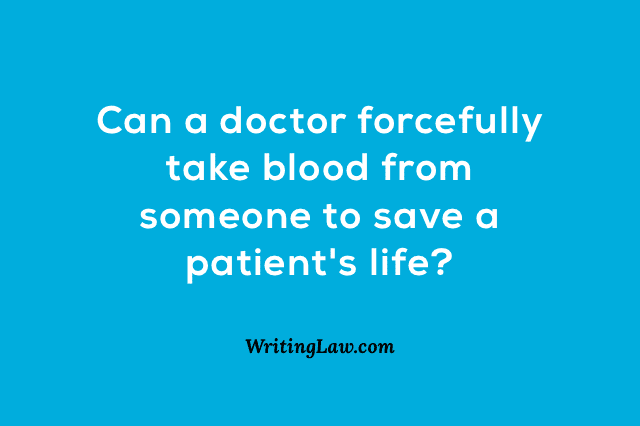
If a doctor forcefully takes blood to save a life, can he claim protection and escape punishment under section 81 IPC?
Question. A doctor is performing an operation on a patient, and he finds that the patient requires rare blood group O negative, and if blood is not given to the patient, then he/she will die. The doctor finds that an attendant has O negative blood group, but the attendant refuses to donate his blood. Then the doctor forcibly takes the blood, and the patient survives. Whether the doctor can claim protection under section 81 of the Indian Penal Code?
Answer. The doctor is liable, and he cannot claim protection under Section 81 of IPC because every person is sovereign (head) of his body. The Doctrine of Necessity applies to cause small harm to avoid big harm.
In this case, when the blood was taken without the consent of the attendant, it is a violation of his sovereignty. It also amounts to a breach of the human rights of a person. A doctor can only advise the attendant to donate his blood. He can not compel the attendant to do so.
If by any chance, the doctor’s action is justified in court, it will have dangerous implications. It may set a precedent that confers the license to a doctor to take the blood of another person forcefully, and then there is the fear of misuse by doctors.
In this situation, if the court finds that the doctor did the job in a bonafide manner, then the court may reduce the degree of liability of the doctor. But the probability of justifying this act is very less.
Note: Doctrine of necessity attracts when small harm is caused to avoid significant harm. In this case, it nowhere attracts this phrase. To understand in detail refer to R vs Dudley and Stephens which is the landmark case of section 81 IPC.
This is a guest post that has been written by the below-mentioned author. Opinions expressed are theirs.









👍👍👍💯
When the doctor forcibly took blood, how is it that he has caused big harm? Why not it will be considered a small harm? How the degree of harm calculated?
The question seems incomplete. But as per the facts written, it is not grievous hurt. There are eight situations laid down in section 320 of the Indian penal code, which causes grievous hurt. The taking out of blood forcibly by the doctor does not satisfy any of the eight conditions.
But yes, it can attract section 324 of IPC, if by cutting through any instrument or using an instrument as a means of weapon which causes death or deleterious to the human body, makes the degree of punishment higher.
For example, If the doctor knows that a person is deficient of haemoglobin, and he still forcibly took out blood from that person’s body, it can cause big harm to such person.